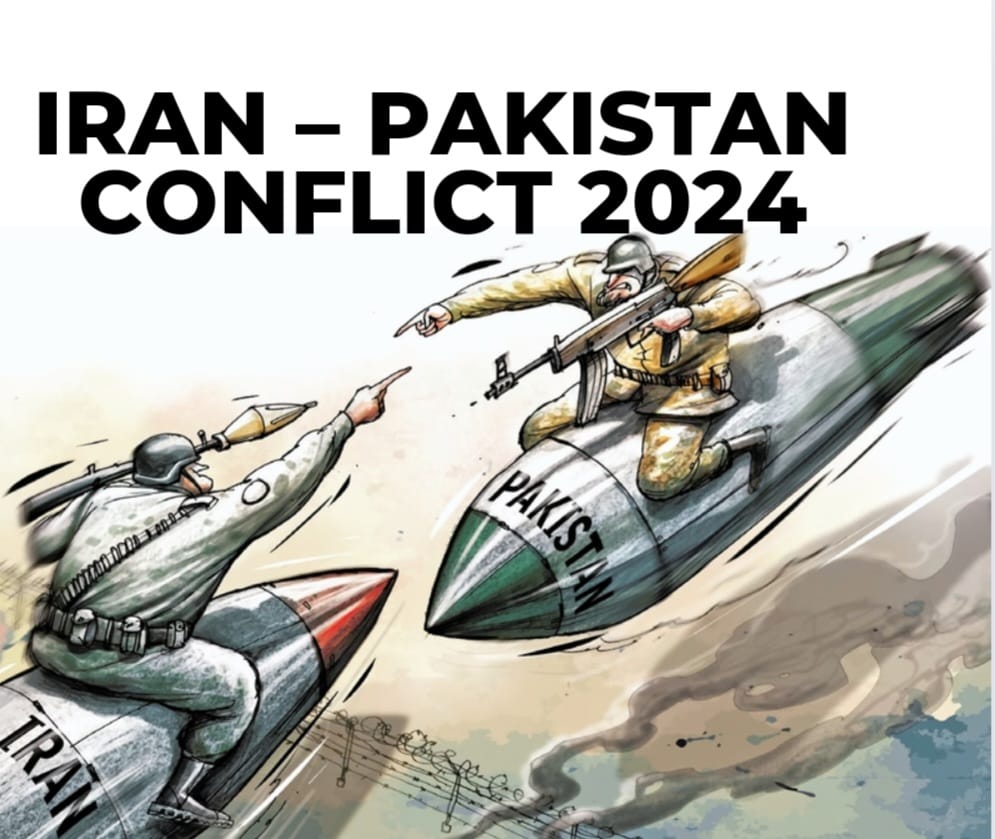Iran – Pakistan conflict 2024

Theme: On 16 January 2024, Iran conducted a series of missile strikes in Pakistan, asserting that it had targeted militants of the Baloch separatist group At the heart of the Iran – Pakistan conflict 2024 lies the volatile border region that separates the two nations. Stretching approximately 900 kilometers, this border has long been a flashpoint for tensions, with both countries grappling with separatist movements and militant groups operating in the area. Against the backdrop of broader regional dynamics and geopolitical rivalries, the conflict underscores the complex interplay of political, ethnic, and religious factors shaping the Middle East landscape Introduction: The year 2024 witnessed an alarming escalation of hostilities between Iran and Pakistan, two neighboring nations with a history of strained relations. Amidst rising tensions across the Middle East, the conflict between these two countries took a perilous turn, marked by unprecedented strikes on each other’s territories. This blog delves into the intricacies of the Iran-Pakistan conflict of 2024, analyzing its underlying causes, immediate consequences, and the broader implications for regional stability. Data Points related to Iran – Pakistan conflict 2024: Rapid escalation of hostilities in 2024 with Iran – Pakistan conducting strikes on each other’s territories. Iran’s strikes targeted alleged militants in Pakistan’s Balochistan province, resulting in civilian casualties. Pakistan’s retaliation included precision military strikes on separatist hideouts in Iran’s Sistan and Baluchestan province. Cross-border attacks highlighted the severity of the conflict and its potential to destabilize the region. Long-standing insurgencies and separatist movements in the border region have fueled tensions between Iran – Pakistan. Militant groups like Jaish al-Adl have exploited grievances to wage attacks on government targets on both sides of the border. Conflict unfolded amidst broader regional turmoil, with Iran’s allies and proxies engaging in confrontations with Israel and its allies. Background: The Iran – Pakistan border region has long been plagued by unrest. This unrest stems from various separatist movements, most notably the Baloch nationalist movement, which has sought greater autonomy or independence for the Baloch people. In the Iran – Pakistan conflict, both the countries have had to deal with insurgencies within their respective territories, and these insurgencies have often found support or refuge across the border. The province of Balochistan in Pakistan and Sistan and Baluchestan in Iran are home to the Baloch people, an ethnic group with a distinct cultural and linguistic identity. These regions are underdeveloped and have seen little benefit from the natural resources extracted there, which has fueled local grievances and separatist aspirations. The 2024 Escalation: The spark for this latest flare-up was Iran’s airstrikes on Pakistani territory, specifically targeting militants in Balochistan. The Iranian government claimed these strikes were aimed solely at eliminating terrorist threats posed by groups like Jaish al-Adl, which has been responsible for numerous attacks inside Iran. However, the strikes resulted in civilian casualties, including the deaths of two children, which inflamed public opinion in Pakistan and led to a sharp rebuke from Islamabad. In retaliation, Pakistan conducted its own military operations against separatist hideouts in Iran’s Sistan and Baluchestan province. These precision strikes were described by the Pakistani military as a necessary response to what they termed Iran’s violation of their sovereignty. The Pakistani government has long accused Iran of harboring Baloch militants who carry out attacks in Pakistan, and these strikes were seen as a direct message to Tehran that such safe havens would no longer be tolerated. Broader Regional Dynamics: The Iran-Pakistan conflict cannot be viewed in isolation. It is part of a broader pattern of regional instability and geopolitical rivalry. The Middle East is experiencing heightened tensions due to various conflicts and power struggles, particularly involving Iran and its allies against Israel and its supporters. The conflict in Gaza, the involvement of Iranian proxies in Lebanon and Yemen, and the broader Sunni-Shia divide are all factors that influence the dynamics between Iran and Pakistan. Iran, predominantly Shia, has positioned itself as a leader of the Shia axis in the Middle East, supporting groups like Hezbollah in Lebanon and the Houthis in Yemen. This has put it at odds with Sunni-majority countries and their allies, including Pakistan. Pakistan, while maintaining a complex relationship with Iran, has historically aligned more closely with Saudi Arabia and other Sunni powers in the region. The involvement of these larger geopolitical players adds another layer of complexity to the Iran-Pakistan conflict. Immediate Consequences: Civilian casualties and the destruction of infrastructure have heightened tensions between the two nations. Both countries have engaged in a war of words, recalling ambassadors and suspending diplomatic visits. The Iran – Pakistan conflict has also led to increased military presence along the border, with both sides conducting military exercises and preparing for potential further escalations. For the local populations in Balochistan and Sistan, the conflict has exacerbated existing hardships. These regions, already marginalized and underdeveloped, have borne the brunt of the violence. The local insurgent groups have gained more recruits as grievances against the central governments have intensified. Diplomatic Efforts and International Response: In response to the escalating Iran – Pakistan conflict 2024, there have been calls for restraint and dialogue from the international community. Neighbouring countries like Turkey have attempted to mediate, holding talks with officials from both Iran and Pakistan. Major powers such as the United States and China have also urged both nations to de-escalate and find a peaceful resolution to their differences. The European Union has expressed grave concern over the violence and its potential to destabilize the region further. The UN has also called for both nations to adhere to international law and respect each other’s sovereignty. Despite these efforts made for Iran – Pakistan the situation remains tense, with both sides showing no immediate signs of backing down. Long-Term Implications: The long-term implications of the Iran – Pakistan conflict are profound. Continued hostilities could destabilize the region further, potentially drawing in other nations and exacerbating existing conflicts. The conflict also highlights the fragile nature of regional alliances and
